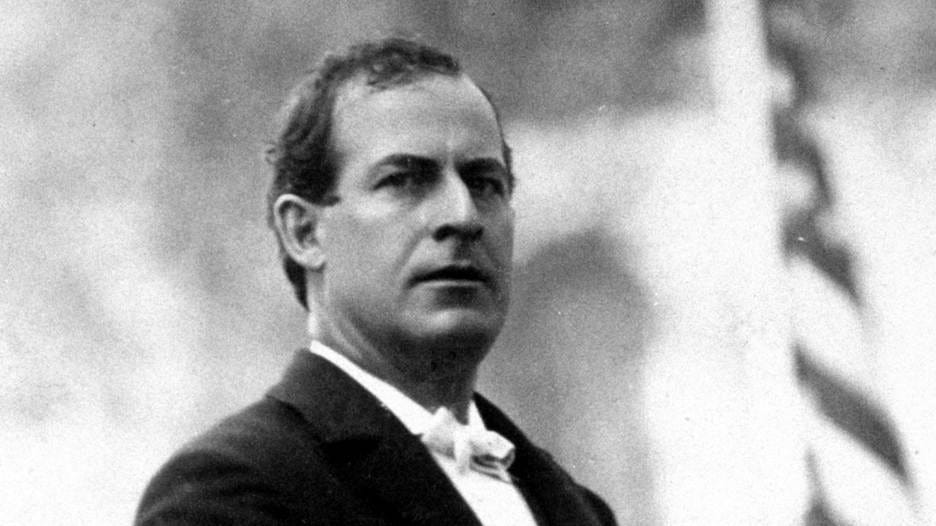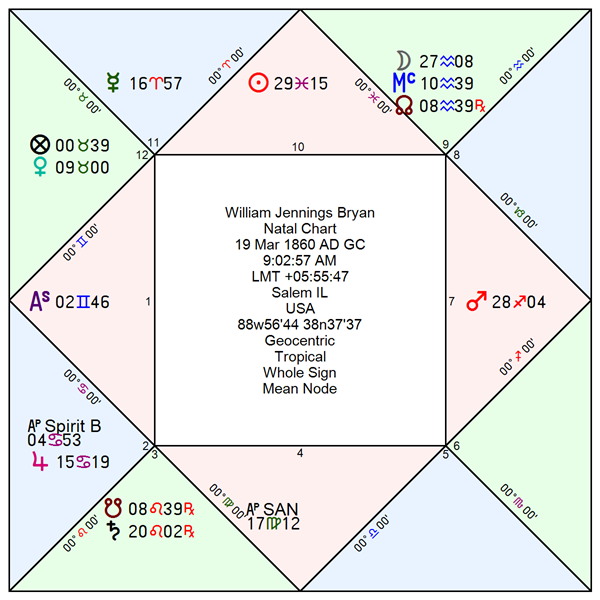William Jennings Bryan is the most prominent example of a left-wing populist political candidate signified by Jupiter in Cancer. His moniker, “The Great Commoner,” is an exact astrological match: Jupiter signifies greatness or largeness, while Cancer is the sign of the public and the common people. After Mussolini, Bryan is the second Jupiter-in-Cancer horoscope in which a maltreated Moon degrades the behavior of Jupiter. In Bryan’s case, the Moon’s application to Mars in Sagittarius signifies his over-the-top moral crusading, which many centrist voters found too extreme. In terms of policy, the Moon’s application to Mars also represents the risk of uncontrolled inflation—a likely outcome of his silver-based monetary policy, had it been enacted.
To be sure, many elements of Bryan’s political platform were later adopted during the Progressive tide of Democratic politics between 1900 and 1920. Bryan was a prophet of the Progressive Era, but not its titular leader.
Photo Credit: Library of Congress
William Jennings Bryan was one of the most influential political figures in late 19th- and early 20th-century America, renowned for his oratory, moral fervor, and unwavering commitment to democratic reform. Born in Salem, Illinois, Bryan rose to national prominence as a gifted public speaker and populist leader who energized the Democratic Party during an era of social and economic upheaval.
Bryan first captured national attention at the 1896 Democratic National Convention with his electrifying “Cross of Gold” speech, in which he denounced the gold standard and championed the free coinage of silver as a remedy for deflation and rural hardship. At just 36 years old, he secured the Democratic nomination for president—the youngest major-party nominee in U.S. history. He would run unsuccessfully for the presidency two more times (1900, 1908), each time advancing a platform of economic and political reform.
Though Bryan never won the presidency, his ideas helped shape the Progressive Era. As a moralist and reformer, he blended religious conviction with a populist economic vision that appealed to farmers, laborers, and reform-minded urbanites. He opposed imperialism, supported women's suffrage, and advocated for stronger antitrust enforcement, bank regulation, and labor protections.
Among the most notable elements of his platform that were later enacted:
Direct election of U.S. Senators (17th Amendment, ratified 1913)
Progressive income tax (16th Amendment, ratified 1913)
Women's suffrage (19th Amendment, ratified 1920)
Banking reform, which culminated in the Federal Reserve Act of 1913
Prohibition, which Bryan supported on moral and religious grounds, enacted via the 18th Amendment in 1919
Antitrust legislation and regulatory oversight of big business
Bryan served as Secretary of State under President Woodrow Wilson from 1913 to 1915 but resigned over Wilson’s increasingly hawkish stance toward Germany during World War I. In his later years, Bryan became a prominent voice in the anti-evolution movement. He famously argued for the prosecution in the 1925 Scopes "Monkey" Trial in Tennessee, just days before his death.
Though derided by some contemporaries as naïve or overly moralistic, Bryan’s legacy is substantial. Many of the reforms he championed became cornerstones of modern American governance. He remains a defining figure in the history of American populism and progressive thought.
ADB Rodden Rating B, Bio/autobiography, 9:15 AM, ASC 6GE14
Proposed rectification: 9:02:57 AM, ASC 2GE46’56”
Rectification details available in excel workbook (Paid subscriber member benefit)
Victor Model factors favoring Jupiter/Cancer
Sign ruler of the Sun
Bound ruler of the Lot of Spirit
Notable configuration: While it appears that Mercury overcomes Jupiter in a separating aspect, the configuration is unusual because Jupiter was stationary direct 9 days before birth and mercury will station retrograde 4 days after birth. This means that while yes Mercury did separate from the square of Jupiter, once it retrogrades and picks up a square from Mars in Capricorn it will then again apply to the square of Jupiter. The planets are so closely linked by this configuration it is difficult to separate their effects from a strict quantitative victor model. So while Mercury scores higher in Victor Stage I testing, Jupiter is still the victor.
Obvious match to life affairs: Nickname as the ‘Great Commoner’ matches “Jupiter in Cancer.”
Physiognomy model factors favoring Cancer
Shape of face is full, with notable round head as he ages.
Skin is smooth
While Mercury is both Ascendant sign and decan ruler, in this case Jupiter in Cancer is the physigonomy significator because of the configuration discussed above.
Moon’s Configuration: Moon separates from Saturn and applies to Mars
The aspect sequence is as follows:
1. Moon in Aquarius: separates from the opposition of Saturn
2. Moon in Aquarius: applies to the sextile of Mars
There is no void-of-course condition or out-of-sign aspects for this horoscope.
Phase 1: Moon Separates from Saturn (Leo, retrograde, conjunct South Node, 3rd house)
Symbolism: Saturn retrograde in Leo, when conjunct the South Node, is weakened and destabilized. The South Node acts as a discharging agent, pulling Saturn’s energy out of Leo and ricocheting it toward Aquarius, the sign where Saturn functions with clarity and rational detachment. Saturn thereby takes on the role of science, institutional reason, and secular authority. The Moon’s separation from this compromised Saturn reflects a departure from scientific objectivity and modernist logic, marking an emotional and ideological turn away from the authority of science.
Biographical Match: This configuration aligns closely with Bryan’s rejection of evolutionary science in the Scopes Trial (1925), where he opposed the teaching of Darwinism in public schools. The trial crystallized his break with modern scientific rationalism and affirmed his role as a moralist rather than a technocrat. Earlier, his 1915 resignation as Secretary of State, objecting to President Wilson’s tilt toward war, also reflected his mistrust of reason-of-state policies—choosing conscience over realpolitik.
Phase 2: Moon Applies to Mars (Sagittarius, 7th house)
Symbolism: The Moon’s application to Mars in Sagittarius marks a movement toward prophetic speech and moral crusading. Mars in this sign does not fight physically or ideologically but preaches—it speaks in broad, righteous terms, often invoking cosmic or religious authority.
Biographical Match: Bryan’s populist campaigns were deeply marked by this Sagittarian Mars. In the 1896 “Cross of Gold” speech, he thundered against the gold standard with revivalist fervor, turning economic policy into a sermon. In the Scopes Trial, his moral appeal against evolution turned the courtroom into a spiritual battleground. His speaking style was neither cold nor calculated—it was evangelical, insistent, and rooted in divine justice.
Supplement: Jupiter in Cancer – The Moral and Economic Foundation
While the Moon makes no aspect to Jupiter in Cancer, this planet still exerts decisive influence over Bryan’s chart as the ruler of Mars. Jupiter in Cancer symbolizes moral populism, protection of the “common man,” and economic policies rooted in emotional and nationalistic concern—especially his advocacy of silver-backed currency. It is the ideological core from which his moral positions flow.
Mars in Sagittarius, ruled by this Jupiter, becomes the instrument of preaching Jupiter’s message. But there’s a blind spot: Jupiter and Mars are in aversion, meaning Bryan cannot “see” the consequences of his delivery mechanism. Mars becomes inflationary—symbolizing the economic consequences of expanding the money supply through silver. Jupiter’s well-meaning policies generate unseen inflationary pressure, expressed through Mars’s fire and excess.
Thus, Mars in Sagittarius symbolizes not just Bryan’s rhetorical force, but the unintended economic expansion caused by Jupiter in Cancer’s silver populism—a crusade whose effects outpaced its vision.
AI Notice: ChatGPT contributed to this article.
Keep reading with a 7-day free trial
Subscribe to House of Wisdom to keep reading this post and get 7 days of free access to the full post archives.



